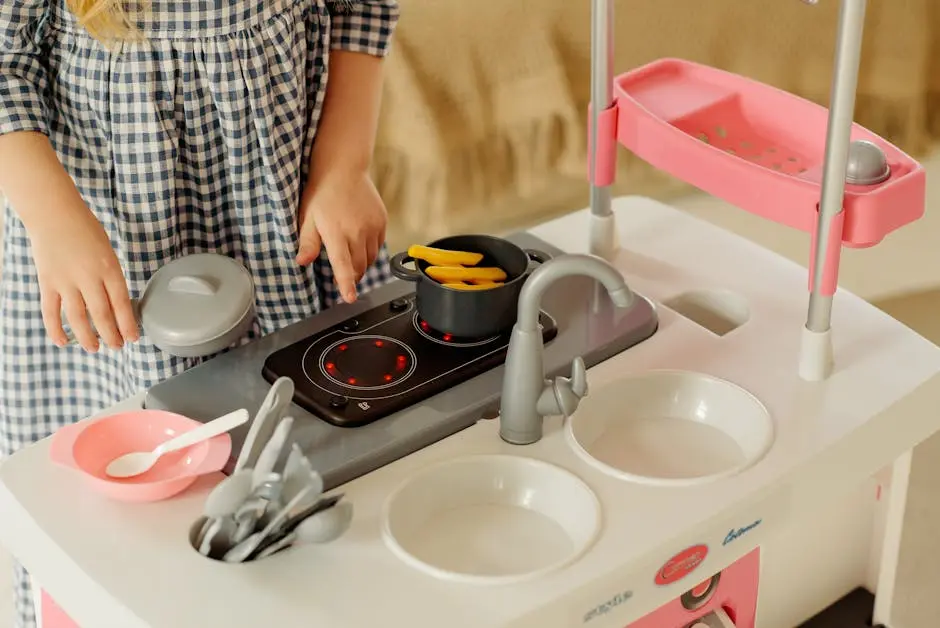
How Does a Tiny Land Play Kitchen Inspire Creativity?
Share
A Tiny Land play kitchen offers more than just a fun way to role-play. It serves as a vibrant backdrop for children’s imaginations, encouraging creativity and exploration in various ways. Let’s dive into how this delightful toy promotes imaginative play and skill development.
Encourages Role-Playing
Role-playing in a Tiny Land play kitchen allows children to step into different personas, from chefs to restaurant owners, fostering creativity and empathy.
This unique experience not only entertains but also educates. When children take on roles, they learn about responsibilities and the intricacies of running a household. This kind of imaginative play opens the door to discussions about food, nutrition, and teamwork.
The flexibility offered by a Tiny Land play kitchen means your child can change roles in an instant. Imagine a child whipping up a culinary masterpiece one moment and acting as a customer at their own imaginative restaurant the next. This constant role-switching enhances their ability to think on their feet.
Furthermore, such role-playing scenarios can lead to real-life conversations about various professions. When children pretend to be chefs, not only do they boost their creativity, but they also gain valuable knowledge about that career path, sparking future interests.
Stimulates Imaginative Scenarios
Children can invent unique stories and scenarios while cooking, which enhances their narrative skills and imaginative thought.
By concocting meals from imaginary ingredients, a child learns the art of storytelling. In a Tiny Land play kitchen, the mundane becomes magical—perhaps a simple apple turns into a large feast, with an entire kingdom gathered for a banquet!
This imaginative play is crucial; it helps develop critical thinking and cognitive skills. As they devise stories around their culinary adventures, kids learn to sequence events and build on ideas, creating expansive worlds filled with intrigue and excitement.
The more elaborate their scenarios become, the richer their vocabulary grows. This is because they’re not just inventing; they’re communicating their thoughts clearly to friends or siblings, fostering a community of story-creation.
Promotes Problem-Solving Skills
As kids navigate pretend cooking and serving, they face challenges that require quick thinking and decision-making, honing their problem-solving abilities.
Imagine a child in a busy play kitchen trying to serve three guests before dinner is burnt. This playful scenario pushes them to think critically about timing and resource management, teaching invaluable life skills.
When they encounter an obstacle—like running out of imaginary flour—the problem-solving process initiates. They must decide how to tackle it: should they make something else or get ‘creative’ to find a solution? These small trials effectively enhance their critical thinking.
In this way, a Tiny Land play kitchen acts as a dynamic platform where mistakes turn into learning experiences. Children gain confidence in their ability to troubleshoot, which is essential as they navigate challenges in everyday life.
Facilitates Social Interaction
Playing together in a Tiny Land kitchen encourages collaboration and communication, essential components for developing social skills.
When children cook together, they must share tasks and ideas. This encourages discussions about preferences and collaboration strategies, making socializing a part of play rather than a standalone activity.
Whether they’re arguing over the best pizza recipe or planning a festive dinner, such interactions teach them to negotiate, resolve conflicts, and empathize with others’ perspectives. These lessons lay the groundwork for healthy relationships.
Ultimately, the Tiny Land play kitchen serves as a vibrant hub where friendships can flourish. Through imaginative eating experiences, kids build bonds while learning the nuances of teamwork and communication.
Unlocking Creative Potential through Play
Incorporating a Tiny Land play kitchen into playtime provides children with endless opportunities to explore their creativity. By engaging in pretend cooking, role-playing, and imaginative scenarios, children develop essential social skills, problem-solving abilities, and a sense of independence. It’s not just a toy, but a gateway to creative expression.

